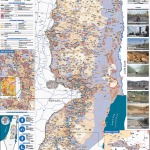Take a moment to imagine yourself in a day in the life of a Palestinian woman. A life in which she lives in constant terror, fearing for not only her own safety but that of her loved ones, as fighter planes and tanks shell and bomb civilian areas, bringing more death, destruction and trauma to her people and community. A life in which she has been displaced and made homeless because her home- the symbol of safety for her and her family- and all of her life’s belongings are callously demolished to make room for another illegal Israeli settlement built on her land. A life in which she must stand for hours at one of the racist, humiliating checkpoints, waiting for a young Israeli occupying force to decide whether or not to allow her to pass through one of the more than 600 checkpoints as she tries to accomplish the simple task of going food shopping or going to an appointment at the doctor, or even for something more urgent such as the delivery of a newborn. Or a life in which she must watch her children wither from malnutrition, anemia and disease and her family sink deeper into poverty, becoming totally dependent on food aid because of the deliberate and systematic practices and polices of the occupying Power.
Read more →

